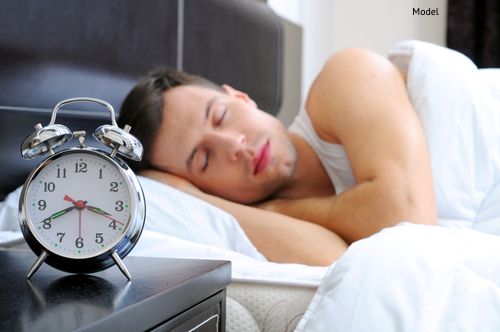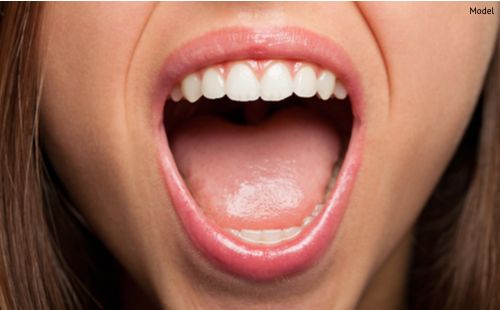Dental Signs of Sleep Apnea
When obstructive sleep apnea is not diagnosed, it can result in unrestful nights, low blood oxygen levels, and severe conditions like coronary disease or cancer.
Unfortunately, since this condition occurs during sleep, many sufferers are unaware that they experience sleep apnea. In fact, it is believed that up to 80 percent of sleep apnea cases go unreported.

Man sleeping with an alarm clock in the foreground
The good news, however, is that your dentist cannot only diagnose the disorder, but they can also help treat it.
What Is Sleep Apnea?
Sleep apnea is a sleeping disorder that affects an estimated 22 million people in the United States.
While more prevalent in men, both women and children can suffer from this condition.
Sleep apnea is often caused when the muscles in the back of the throat relax and block the airway.
This blockage causes temporary pauses in the breathing patterns during sleep, sometimes for as long as 10 seconds.
Apnea can be due to excess weight, family history, alcohol and tobacco use, genetics, or lifestyle.
Sleep apnea is identifiable and treatable by your dentist.
What Are Sleep Apnea Symptoms?
Sleep apnea symptoms vary on the patient and their specific causes for the condition.
The most common symptoms include loud snoring, jaw pain, a sore or dry throat when waking, morning headaches, a choking or gasping sensation, lack of energy during the day, difficulty concentrating, mood changes, and sleepiness.
How Can Your Dentist Identify Sleep Apnea?
When you are sitting in the chair, your dentist has full visual access to your throat and your airways.
If you feel as though you are exhibiting signs of sleep apnea, dentists can look for a few different medical signs to officially diagnose the disorder:

Young pretty woman teeth extreme closeup photo.
Acid Reflux
Acid reflux typically occurs when the contents of the stomach enters back into the esophagus.
When acid reflux occurs regularly, it is often diagnosed as Gastroesophageal Reflux Disease (GERD).
Even though GERD deals with the stomach and esophagus, it can have a significant impact on sleep and sleep apnea.
This is because the acid that travels into the esophagus can go all the way to the larynx, causing a choking sensation.
Bruxism
Bruxism is more commonly known as the grinding of your teeth during sleep.
Recurring bruxism can result in tooth, jaw, and head pain, or the fracture of the teeth.
While bruxism has several causes, one of them is sleep apnea. Teeth clenching or grinding occurs when an individual tries to regain control of their airway following an apneic episode.
Bruxism is treated by wearing a mouth guard during sleep.
Macroglossia
Macroglossia is caused when the presence of a large tongue blocks an individual’s airway and contributes to obstructive sleep apnea.
Sleep Apnea Treatments
Sleep apnea is often treated with a continuous positive airway pressure device (CPAP); however, it can also be treated through dental means.
Some dental appliances and techniques will reposition the lower jaw and tongue to open up the airway and prevent apneic episodes.
Have More Questions?
If you think you may be suffering from sleep apnea, ask Dr. Fiss to evaluate your airway.
Contact his office in Chicago by calling (312) 642-6631 or by filling out our online contact form.